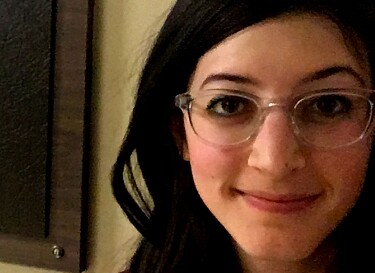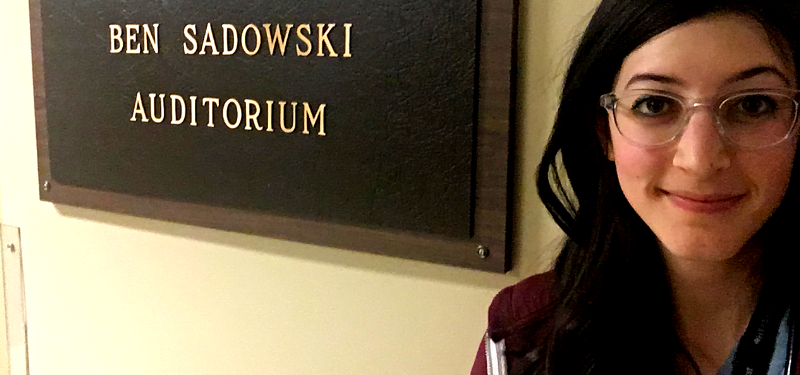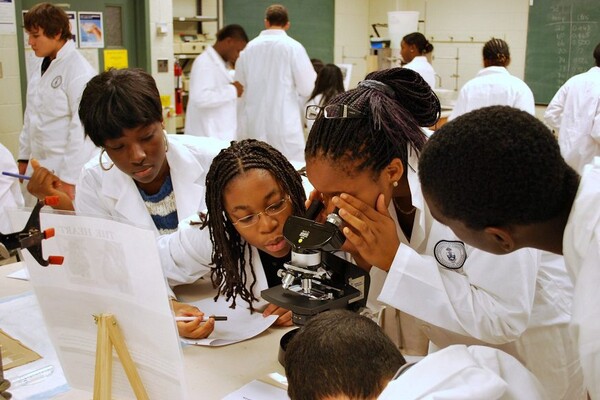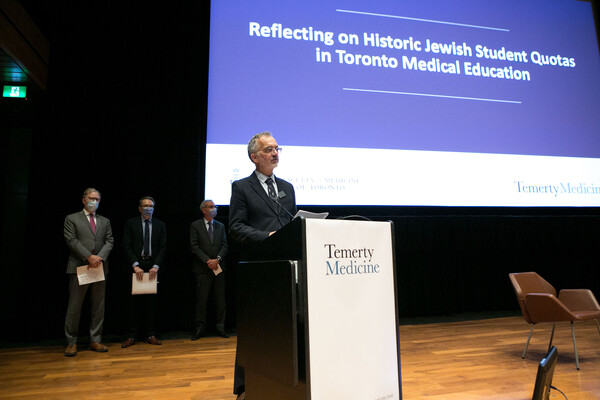Mobile Menu
- Education
- Research
-
Students
- High School Outreach
- Undergraduate & Beyond: Community of Support
- Current Students
- Faculty & Staff
- Alumni
- News & Events
- Giving
- About

Lindsay Herzog

Mount Sinai Hospital welcomes hundreds of postgraduate residents every July, who are key providers of care and learners on the road to independent practice. As an academic health science centre affiliated with the University of Toronto, Mount Sinai Hospital's programs support training in specialized areas of clinical expertise for trainees from around the world.
Dr. Lindsay Herzog had a unique family connection to Mount Sinai Hospital as a postgraduate resident. More than 60 years ago, her great-great uncle, Ben Sadowski, had helped to transform Mount Sinai from a small, overcrowded hospital in Yorkville into the academic institution on University Avenue we know today. As her residency draws to a close, Lindsay reflects on her time at Mount Sinai and the importance of the hospital to her personally.
I write this as I look at a photograph of my grandpa, Marvin Sadowski, nephew of Ben Sadowski, my great-great-uncle. I think about the life I’ve had because of this man, whom I never knew. Ben Sadowski was recruited in the late 1930s to help expand Mount Sinai Hospital. Originally situated in Yorkville, Mount Sinai was becoming overcrowded, representing the rarity of spaces for Jewish doctors to practice. Ben Sadowski assembled a team to assist in the expansion, with the ultimate goal of Mount Sinai becoming affiliated with the University of Toronto, as one of the Faculty of Medicine’s teaching hospitals. To many this seemed an impossibility, and concerns were raised regarding the potential loss of its independence and connection to the Jewish community. Despite this, Ben felt New Mount Sinai could be a hospital that would maintain its roots, while growing into its potential of an academic teaching hospital. Many agreements, disagreements and years later, New Mount Sinai opened its doors on University Avenue in 1953.
In 2016, I matched to my residency program of choice — family medicine at the University of Toronto. After matching, we ranked the various family medicine sites in order to be placed at one for the next two years. I ranked Mount Sinai first. How could I miss out on the opportunity to train in the hospital where I had first experienced family medicine as a medical student, and decided this was my future? How could I miss out on learning from the family doctors who had helped me get to this point? And not long after this, I began my two-year residency at Mount Sinai Hospital.
I went to the hospital to get prepared for my residency. I walked through the Hall of Chairmen on the main floor and paused in front of Ben Sadowski’s portrait.portrait of Ben Sadowski Towering over me, I saw a similarity in our features. I remember my parents pointing out this portrait when I was young and we were at the hospital. “That’s your great-great uncle. He helped open this hospital.” ‘Cool,’ I thought. I had a big family; I didn’t feel connected to my great-great uncle. But I did think it was cool that he helped open a hospital. And on that first day of residency, I felt the same way. Pretty cool that my great-great uncle helped open this hospital. Even cooler that I’m a resident here.
I continued on to get my scrubs, my pager, and my ID badge. I would grow to have a complicated relationship with these items over the coming years, but on day one, they felt like treasures. Precious gold that I was privileged to hold. To wear when I rushed into a delivery room to bring new life into the world; to respond to when families had questions about their sick loved ones; to use to exit the back door of the Emergency Department so I could avoid the faces of the exhausted and scared patients in the waiting room, wondering when they’ll be seen and what will happen next for them — would they get to go home? I was so grateful I got to go home.
There were nights on call, of endless hours of running around, hoping for a quiet moment to sit, to breathe, to eat if I was so lucky. And when I did get these moments, I would walk past my great-great uncle’s portrait and pause and stare. I would feel a sense of grounding, of family. The hospital can be pretty isolating, and when you haven’t stopped moving for 20 hours, you can begin to feel pretty detached from the rest of the world. But his portrait would ground me. For a moment I felt a sense of stillness, a breath, a reminder of how lucky I am to be where I am; that in a few hours, I would walk out the front doors of the hospital, my feet on the ground, and would soon be home and in my own bed. How lucky I was to be privileged enough to have the opportunity to enter medical school, to match to family medicine at the University of Toronto, to be a doctor. To be Jewish. To be female. To be a Jewish, female, resident doctor. Had I been born decades earlier, this would not have been the case. Had my great-great uncle Ben Sadowski not fought hard to have Mount Sinai affiliated with the University of Toronto, providing a space for Jewish trainees, this would not have been the case. And for a moment, I felt grounded. Back to the chaos. Back to the sleepless call shifts. But this time with gratitude, for the institution in which I was learning and for coming from a line of Jewish men and women who made this opportunity possible.
Time went on. I grew closer and closer to Mount Sinai. I spent the majority of my days (and often my nights) in the family medicine clinic or the hospital. I was given a window into thousands of lives I would never lead. I developed connections with patients, with residents, with staff. I became a family doctor. Mount Sinai raised me from a nervous medical student to a self-assured family doctor.
Time went on. My last call shift in the hospital arrived and I had a moment of quiet, so I rushed up to the 18th floor. I stood in front of the Ben Sadowski Auditorium and paused. I felt connected. To a man I never knew and to my mother’s maiden name, which suddenly felt like a part of me I had never known. I thought of my grandfather, who had passed away a year and a half earlier. In one of our last conversations, my grandpa asked me how residency was going. I told him it was going well and I was really happy at Mount Sinai. He grinned, and said if only my last name were Sadowski, everyone would know I was related to Ben Sadowski. But they didn’t know. I carried it like a secret treasured possession. So, thank you, great-great uncle Ben Sadowski for giving me this treasure. Thank you for building these walls for Jewish doctors to provide care and for Jewish trainees to grow, to learn, to practice, to heal. Thank you for giving me this place that I grew to call home.
Lindsay Herzog is a family physician who completed her two-year family medicine residency at Mount Sinai Hospital in 2018. She then participated in the self-directed enhanced skills program in adolescent health, as well as the education scholar program in the Department of Family and Community Medicine at the University of Toronto.


